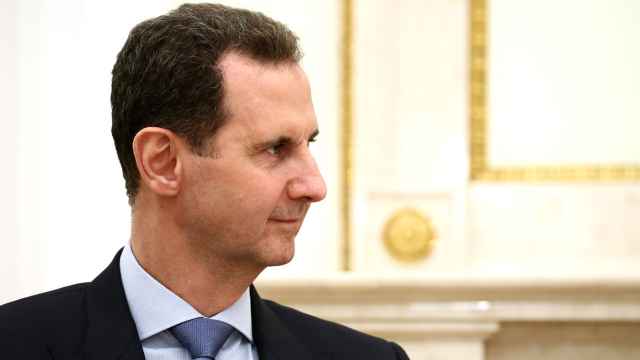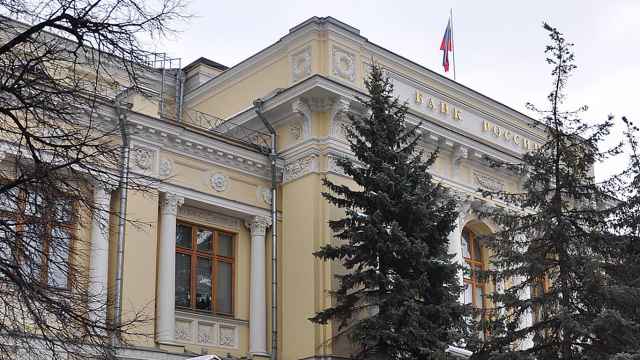"Which side were you on in World War II?" is not a question that often arises on radio talk shows but a Russian caller named Alexander was asked precisely that at least three times on Tuesday when he expressed support for Ukraine's new rulers.
The judgment was quick. Two Russian presenters decided Alexander must have been on the side of the fascists who fought Soviet forces during the war because he refused to condemn the new Ukrainian leadership.
"Do you know how many Russians Bandera killed?" asked the outspoken host of the morning phone-in, Vladimir Solovyov — a reference to Stepan Bandera, leader of the Ukrainian nationalist movement that was formed in western Ukraine and is accused by Russians of siding with the Nazis.
On Russian television, weeks of footage of wounded policemen and burning tyres have given way to sober pictures of politicians and Ukrainians predicting Ukraine will split after opposition forces took control in Kiev and the president fled.
In a sign the Kremlin is shaken by losing a struggle for influence with the West in its neighbor, the language has been set against the us-or-them background of the Soviet victory against Adolf Hitler — a source of national pride.
The people of western Ukraine — culturally and linguistically distinct from the Russian-speaking east — have borne the brunt of the blame.
It was these men and women that Alexander was trying to defend. He was cut off when Solovyov said he should leave his address and phone number so the police could find him and arrest him for promoting fascism.
By issuing a rallying call from the Soviet playbook when the war was used to inspire loyalty if not to communism, then against a common enemy, the Kremlin has successfully shifted the focus from its own loss of face.
That has allowed some Russia politicians, namely those from the finance and economic ministries, quietly to offer some cooperation in finding an international deal to pull Ukraine away from a bankruptcy which could also drag Russian down.
Hitting the Weak Spot
Ukraine's parliament has hit at the heart of many Russians' fears, restoring Ukrainian as the obligatory national language in official documents.
On Tuesday, Russia's Foreign Ministry condemned the "barbaric Russophobia" that inspired some Ukrainians to pull down a statue in the western Lviv region of Mikhail Kutuzov, a Russian field marshal in the Napoleonic war.
"We demand the new Ukrainian authorities stop this lawlessness," the ministry said in a statement.
In the State Duma lower house of parliament, politicians took turns to lament the "uncultured hooligans" who had taken control of the streets.
Sergei Mironov, head of a pro-Kremlin party's parliamentary faction, said those Ukrainians who wanted Russian citizenship should be given passports as quickly as possible.
People in the Russian-speaking east, where there is more sympathy for Moscow, are particularly upset about new laws on the use of the Ukrainian language, fearing it could create problems for them in their business.
With efforts now underway to ban television channels from countries that have not signed up to a European convention on cross-border television, which means all Russian channels, many Russian politicians are livid.
In response, Russian state television has taken to showing Ukrainians in Ukraine's Russian-speaking Crimea to the south and in its east saying they would not follow orders from Kiev.
Prime Minister Dmitry Medvedev even resorted to language similar to that which he employed as president when sending Russian troops into another Soviet republic, Georgia, in 2008, then supporting Kremlin-backed separatists in South Ossetia by saying there were threats "to the lives of our citizens".
But Russia will — at least for now — probably stick to rhetoric, waiting to see whether efforts by the European Union and the U.S. to help unite a fractured country backfire.
"Ideologically 'New Ukraine' will inevitably be based on an anti-Russian foundation," said Alexei Pushkov, a Putin loyalist and a senior member of parliament.
He added: "'Democracy' combined with Bandera."
A Message from The Moscow Times:
Dear readers,
We are facing unprecedented challenges. Russia's Prosecutor General's Office has designated The Moscow Times as an "undesirable" organization, criminalizing our work and putting our staff at risk of prosecution. This follows our earlier unjust labeling as a "foreign agent."
These actions are direct attempts to silence independent journalism in Russia. The authorities claim our work "discredits the decisions of the Russian leadership." We see things differently: we strive to provide accurate, unbiased reporting on Russia.
We, the journalists of The Moscow Times, refuse to be silenced. But to continue our work, we need your help.
Your support, no matter how small, makes a world of difference. If you can, please support us monthly starting from just $2. It's quick to set up, and every contribution makes a significant impact.
By supporting The Moscow Times, you're defending open, independent journalism in the face of repression. Thank you for standing with us.
Remind me later.





